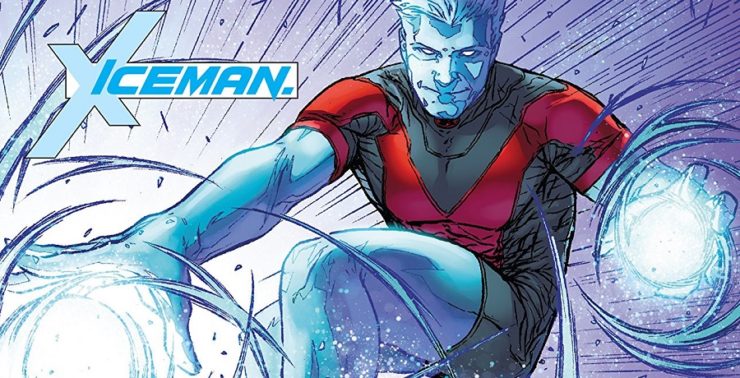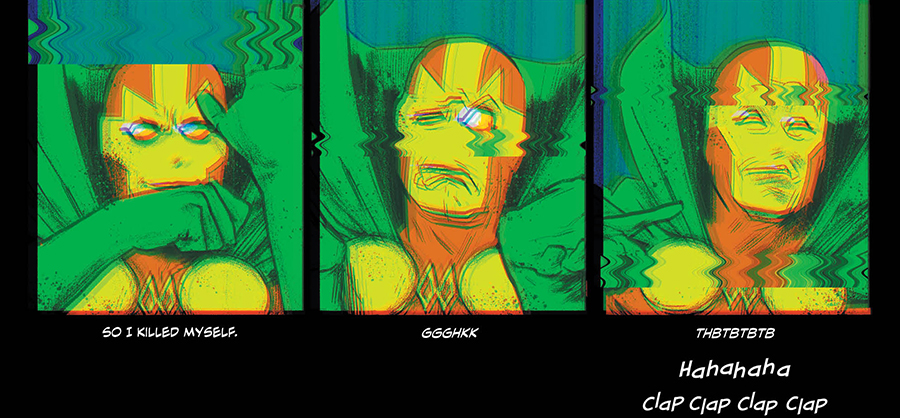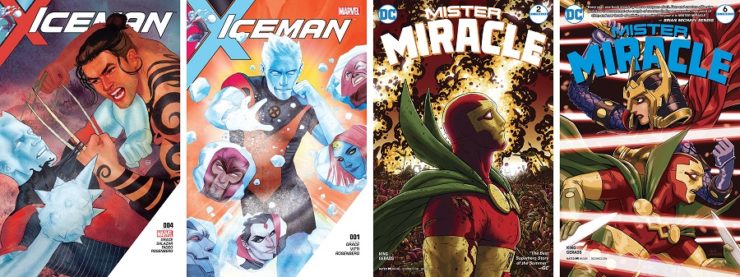We’re kicking off a new year of Pull List with two series that couldn’t be more different. Both feature men who are haunted by their troubled families, and each is still trying to untangle the damage to his psyche from his unpleasant childhood. But that’s about where the similarities end. The divide between the characters is bigger than Marvel vs. DC. Where Iceman is charismatic and playful, Mister Miracle is deep and introspective. Bobby Drake is a charming do-gooder and walking dad joke factory while Scott Free is an angst-ridden warrior who may be losing his mind.
Perhaps the biggest difference is that one comic book is demonstrably better than the other.
Iceman

Bobby Drake finally gets his own solo series, but unfortunately Iceman disappoints with missed potential. It’s not the easiest series to jump into if you, like me, avoided Civil War II like the plague and nothing about Iceman other than what you vaguely remember from a 20(!!!) year old X-Men movie. For a 21st century story that makes the minorities/mutant metaphor explicit, it’s pervasively cis, white, and male. Only one particular brand of queerness is explored here, and from a rather limited perspective, which is especially frustrating since it’s written by Sina Grace, a gay Persian American man. Moreover, the moral of the story—that we make our own families and don’t have to settle for people who disdain us – is lost in the conflicting subplots. The Purifiers spout extremist Evangelical rhetoric while trying to murder all mutants, and Bobby’s parents couch their homophobia and anti-mutant bigotry in passive aggression. Bobby’s parents and the Purifiers are on the same spectrum but the Drakes are absolved seemingly only because their bigotry isn’t physically violent.
Alessandro Vitti’s art isn’t helping matters, either. His use of thick lines works great for action sequences, but is distracting in faces. It’s even wonkier in close-ups where the linework overpowers facial expressions. Vitti’s style does little justice for a series this light and goofy. Rachelle Rosenberg and Joe Sabino do wonderful work on the colors and lettering, respectively, but the art is not jiving with me.
Despite all that, I actually do think Iceman is worth reading. It has plenty of issues, but they aren’t life threatening. The series is not bad by any means, I just wish it was as good as it could be. Bobby is a fantastic character. He’s quippy and cute, with a great outlook on life. I loved seeing his bond with Kitty shift from grumbly exes to close friends, and his older brother-esque relationship with the wibbly-wobbly-timey-wimey version of his younger self is enjoyable and honest.
A bit of retooling and refocusing and Iceman could be as charming as Bobby Drake’s dumb jokes. His journey of queer discovery is worth exploring, but this isn’t the right team to tell the best version of that story. It’s too bad Marvel chose to cancel the series rather than right the ship. Between this and America getting the axe, we’ve lost all queer-led Marvel comics. Now that’s a damn shame.
The 1st issue was published by Marvel in June 2017. There are 9 issues currently out, and the final is scheduled for March 2018. Writer: Sina Grace; art: Alessandro Vitti, Robert Gill; colors: Rachelle Rosenberg; pencils: Edgar Salazar, Ibraim Roberson, Robert Gill; inks: Ed Tadeo, Ibraim Roberson, Robert Gill; letters: Joe Sabino; cover art: Kevin Wada.
Mister Miracle

Where Iceman fumbles its message, Mister Miracle scores again and again. Scott Free, aka Mister Miracle, was raised in a hellscape alongside Big Barda before escaping and coming to Earth. Now married to Barda and living high as a famous escape artist, it seems like everything is perfect. There’s nothing he can’t escape from…except maybe death. The series opens with Scott attempting suicide, and each issue explores the ramifications of that act and recontextualizes it by revealing the events that led up to it. This story isn’t just about death, but life and living. Scott is always trying to escape from things, but what does it mean to live a life that you don’t need or want to escape from? What does it mean when life isn’t a box you’re trapped in but a home you’ve built with someone you love?
Tom King tells Scott’s story in layers. On the surface is the war between New Genesis and Apokolips and all the bloodshed that entails. The next level down is the political machinations between Orion, wicked Granny Goodness, and reluctant Scott. Then come the myriad layers of psychology, everything from his suicide attempt to his depression and mental instability to his fractured familial relationships to his difficulty processing his past. And underneath all that is the hint that none of this is real, that it’s all in Scott’s head.
I really shouldn’t have to tell you how fantastic the creative team is. King, Mitch Gerads, and Clayton Cowles nail pretty much every comic book they’re on, and Mister Miracle is no exception. Before I picked up this series I didn’t even know Mister Miracle even existed, but King does an excellent job of revealing the highlights through flashbacks, creative narration, and subtext. Gerads illustrations are absolutely gorgeous, a true work of art. Clayton Cowles’ lettering is perfect and perfectly placed. It’s not just text; his work is art unto itself. It enhances King and Gerads’ work in the best possible way.
I could spend my whole word count waxing rhapsodic on this trio. What they’ve achieved here is simply stunning. Mister Miracle is a subtle, powerful story that’s as amazing to look at as it is to read. This is what happens when the right team works on the right book. And with that, I’m off to re-read all six issues and fret about that final cliffhanger.
The 1st issue was published by DC in August 2017, and the 6th released this month. Writer: Tom King; pencils, inks, and colors: Mitch Gerads; letters: Clayton Cowles; cover art: Nick Derington.
Alex Brown is a YA librarian by day, local historian by night, pop culture critic/reviewer by passion, and QWoC all the time. Keep up with her every move on Twitter, check out her endless barrage of cute rat pics on Instagram, or get lost in the rabbit warren of ships and fandoms on Tumblr.










